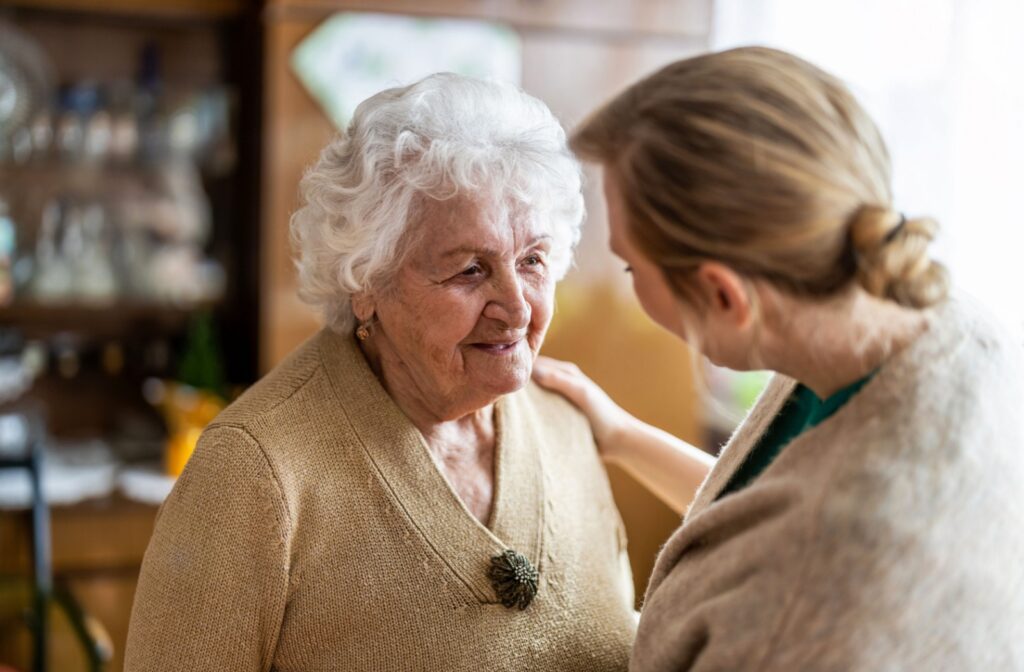Making the decision to transition a loved one to assisted living is one of the most emotional and challenging choices a family can face. It’s a delicate balance between honoring their independence and ensuring their safety, health, and happiness.
For many families, this decision is accompanied by feelings of guilt, uncertainty, and even fear of the unknown. But here’s the truth: assisted living isn’t about giving up independence—it’s about enhancing quality of life and creating a supportive environment where your loved one can thrive.
The Benefits of Assisted Living
Assisted living isn’t just about meeting basic needs—it’s about creating a lifestyle that prioritizes safety, wellness, and joy. Here’s how it can transform your loved one’s life:
- Enhanced safety and security: With emergency call systems, fall prevention measures, and round-the-clock care, you can rest easy knowing your loved one is in a safe environment.
- Access to healthcare services: From routine medical care to therapy and medication management, assisted living communities provide comprehensive health support.
- Nutritious meals and dietary support: Say goodbye to skipped meals or unhealthy eating habits. Residents enjoy chef-prepared meals tailored to their dietary needs.
- Opportunities for socialization: Regular activities, outings, and events keep residents engaged, active, and connected.
- Freedom and independence: Assisted living empowers residents to choose how they spend their time, pursue hobbies, and enjoy life on their terms.
Recognizing the Signs: When Is It Time?
Every family’s journey is unique, but there are common signs that indicate it may be time to explore assisted living. These signs often revolve around health, safety, and overall well-being.
1. Declining Health and Mobility
Has your loved one experienced frequent falls, difficulty moving around, or worsening chronic conditions? These changes can make daily life unsafe and stressful. Assisted living communities provide 24/7 support, medication management, and emergency response systems, ensuring your loved one has the care they need while enjoying a vibrant community.
2. Struggles with Daily Activities
If daily tasks like cooking, cleaning, bathing, or dressing have become overwhelming, it’s a clear signal that extra help is needed. These challenges can lead to poor hygiene, malnutrition, or even hazardous living conditions. Assisted living offers personalized support, allowing residents to maintain their dignity and independence while receiving the assistance they need.
3. Social Isolation
Loneliness and isolation can take a serious toll on mental and emotional health. If your loved one spends most of their time alone or has lost interest in social activities, assisted living can be a game-changer. These communities are designed to foster connection, with group activities, events, and opportunities to build meaningful friendships.
4. Caregiver Burnout
Caring for an aging loved one is an act of love, but it can also be physically and emotionally exhausting. If you’re feeling overwhelmed, stretched thin, or unable to meet their needs, it’s okay to seek help. Assisted living allows you to focus on your relationship with your loved one, rather than the demands of caregiving.

Starting the Conversation: How to Approach This Sensitive Topic
Talking to a loved one about assisted living can feel daunting, but with empathy and preparation, it can be a constructive and positive conversation. Here are some tips to guide you:
Start Early
Don’t wait for a crisis to bring up assisted living. Starting the conversation early allows your loved one to share their preferences and be part of the decision-making process. It also gives you time to explore options together without the pressure of urgency, ensuring a thoughtful and informed choice.
Listen with Compassion
Transitioning to assisted living can feel overwhelming. Encourage your loved one to share their thoughts and fears, and listen with empathy. Validate their feelings and reassure them that their well-being is your priority. Open, compassionate communication builds trust and eases the process.
Highlight the Benefits
Focus on how assisted living enhances quality of life, whether it’s the safety of having help nearby, the joy of new friendships, or the relief of no longer managing household chores. Framing it as a positive step can help shift the conversation from fear to opportunity.
Tour Communities Together
Visiting assisted living communities can help your loved one visualize this new chapter. Seeing the warm environment, meeting staff, and interacting with residents can ease their concerns and build excitement.
A Positive Step Forward
Deciding when it’s time for assisted living is never easy, but it’s a decision rooted in love and care. By recognizing the signs, understanding the benefits, and approaching the conversation with empathy, you can help your loved one transition to a lifestyle that supports their health, happiness, and independence.
At Providence Place Senior Living, we understand the importance of this decision. Our communities are designed to provide compassionate care, vibrant social opportunities, and a safe, welcoming environment where your loved one can thrive.
Book a tour and visit us to learn more about how we can support your family during this important transition. Let’s take this step together.




